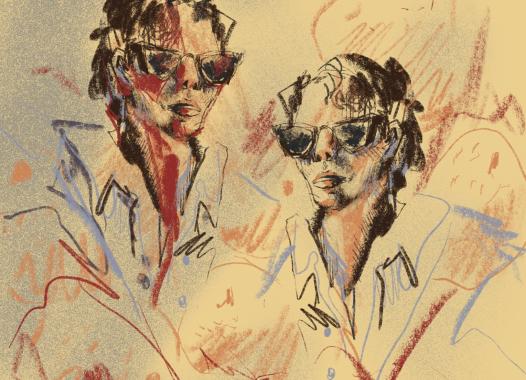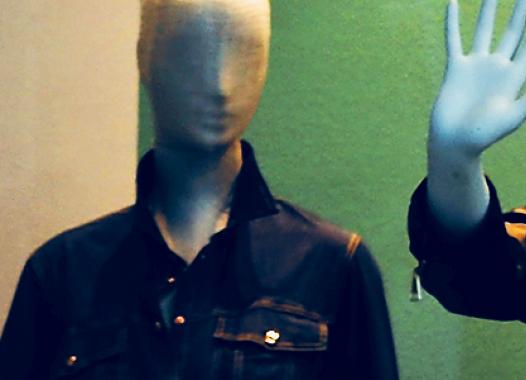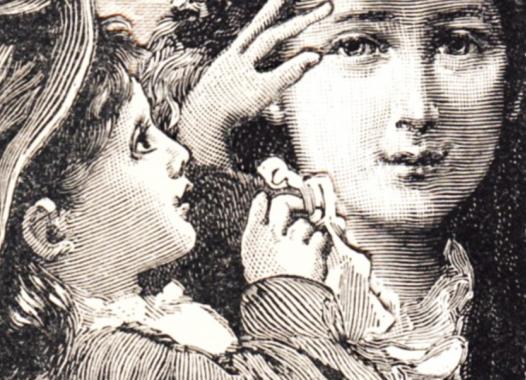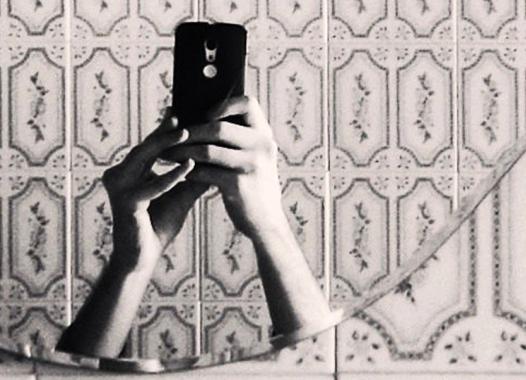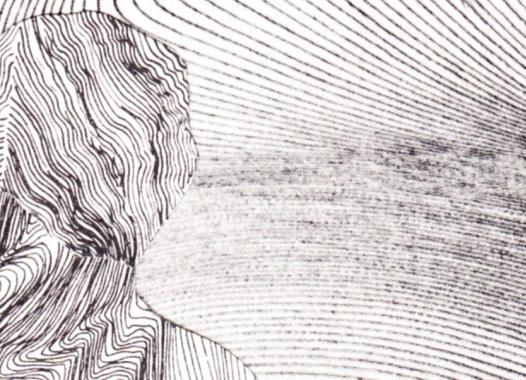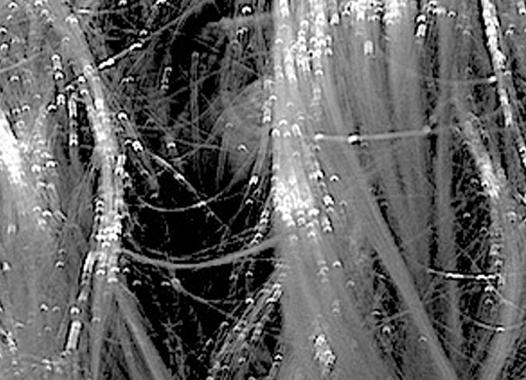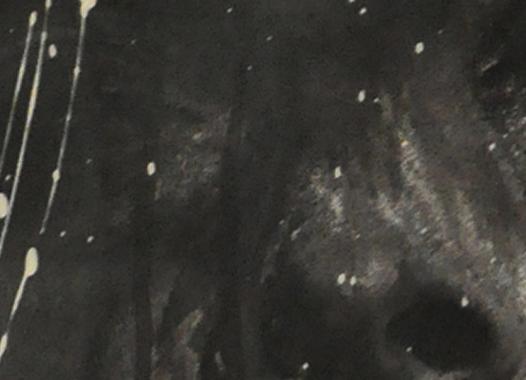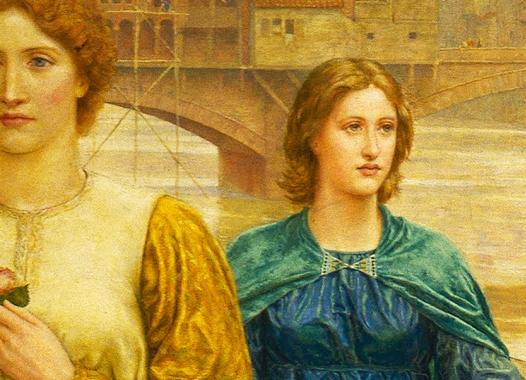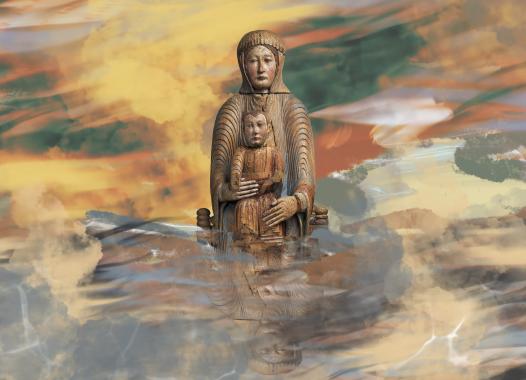
Translated by Nicole Gounalis. The original Italian first appeared online at Storie.
We don’t need to know who the woman is who goes grocery shopping when she isn’t writing. We are interested in other things, for example the influence Elsa Morante’s House of Lies had on her, writes BARBARA ALFANO, a Neapolitan professor, scholar of Elena Ferrante, and American transplant. The unveiling of the writer’s identity and the eventual recognizability of characters as real people would have neutered and diluted the stories, she insists. All true, until…
Elena Ferrante didn’t win the Man Booker International Prize. It wouldn’t occur to anyone to consider this a defeat, since all six finalists, and their respective translators, have, in a certain sense, already won. The matter at hand is choosing one of the six. In the case of Elena Ferrante, however, a question comes to mind that, even if not posed openly, persists as a stumbling block, like the proverbial elephant in the room.
Would the jury have really given the prize to an absent author, in the very year that, for the first time, they wanted to award writers and translators in equal measure and present them together, side by side, as has happened to Han Kang and Deborah Smith? I don’t have an exact response, but I do know that until today I thought that Elena Ferrante’s anonymity was a national treasure for us to protect, as we protect the laws that safeguard women’s rights and the Marsican brown bear.
Until yesterday I fervently believed that renouncing her anonymity would cost Ferrante the power of her writing, which is generated by a great honesty of sentiment and emotion, the kind that can be found only by digging deep within one’s own being and personal history. She herself has written: “I use plot, characters, as a tightened net for pulling all that is alive out from the depths of experience, for wringing it all out, including what I myself have pushed furthest away because it seemed unbearable” (La frantumaglia, pp. 217-218, translated by the translator). It seems to me that this aspect, of all the possible meanings that biographical information may have, is the most important that an author can reveal in her work. The eventual recognizability of characters as real people would neuter and dilute the stories.
Rather, it seemed to me, and it seems, essential that Ferrante’s writing remain tethered to the themes that are addressed in both her first three novels and the Neapolitan tetralogy. Ferrante’s stories tell of women who must reinvent themselves away from the male gaze, who must redefine a possible relationship with their mothers, women who have a difficult relationship with maternity, women who must recognize themselves in their connections with other women, women in flight from a culture that crushes them. In the interviews she’s given, Ferrante is always very honest in relating these experiences to her own. It would be a very good thing if Ferrante’s voice remained a powerful one in an Italy that has difficulty recognizing the heritage of a patriarchy that still influences the culture.
For the academy, it doesn’t matter who the person Elena Ferrante is. [1]
And yet, without even contradicting her need to remain anonymous, reading Ferrante, and teaching her, can be a very personal thing. For me, a woman from Naples who lives and works in the U.S., it has been a continual laying open of myself to the process of ferrying between one culture and another, between the past and the present, and of acting, shamefully, as a crystal ball for a class of young students for whom, for example, it is difficult to understand certain cultural attitudes very deeply engrained in Ferrante’s characters. Questions like, “Why does Delia in Troubling Love have sex with Antonio only to please him, when she is indifferent to him?” bring you to recounting the how and why of a culture that has been part of your own personal story. You realize, then, that in Italy this cultural heritage, as presented in Ferrante’s works, doesn’t signify much, unless in a specific environment.
With notable exception (see, for example, Goffredo Fofi), [3] the world of Italian literary criticism, that which appears in the cultural pages of the top newspapers, did not take much notice of the significance of Elena Ferrante’s work, dedicating much space to her personal absence and commenting on the value of her writing only as an aside, leaving to the author herself the task of putting together these two aspects in the various interviews she’s given. And since some Italian critics put little stock in Americans when it comes to aesthetic judgment, transatlantic success didn’t help, which gave Ferrante back to us, but at a slant, exaggerated. This returned image was perceived dubiously by Paolo Di Paolo, for example. [4]
We had to wait for the important, substantial interview conducted by Nicola Lagioia [5] to finally see the themes and style of Ferrante’s novels contextualized, with seriousness and within a broader discourse about narrative, and not just Italian narrative. Finally, a conversation that understands something about literature.
The value of Elena Ferrante’s work obviously has not escaped the academic world, nor that of feminist culture. Already in 2004 Luisa Muraro understood its importance and wrote:
La frantumaglia is a real book, notwithstanding the way in which it was composed. It is because it is the incarnation of a notably energetic thought. And she who has written the different texts that comprise it has the ability (the force, the freedom, the gift?) to say what she thinks as she feels it. Here I will offer nothing close to a worthy review; I will only draw out some elements in order to do something that I have had inside me for months, for years. This is finally thinking about what is happening to us, especially between women and men, and therefore putting an ear to current ways of speaking and writing, losing a certain language that makes us precious and taken for granted [translated by the translator].
In comparison, Paolo Di Paolo’s commentary on La frantumaglia, written for the newspaper La Stampa ten years later, reads like nails on a chalkboard:
They’re sentimental enough, the dialogues with journalists and critics collected in 2003 in the volume La frantumaglia. The interviewers send the questions to the publisher e/o and then the responses arrive, from who knows where. They’re thoughtful, with the posturing and flirting of a person who doles them out with an eyedropper and ends up more irritating then the worst narcissists. It’s a book full of bowing and scraping, of embraces, of false confessions: a corpus for the impossible body of the Great Absent One of Italian literature. [6]
Di Paolo doesn’t even notice the ‘notably energetic thought’. For years, Elena Ferrante has explained and re-explained the reasons for her absence, which in reality is the strongest possible presence of the author in her work. She has tried to make us understand. She said clearly in an interview in 2003, in the newspaper La Repubblica, what she has repeated before and since, and in different guises, to all the newspapers and publications, national and international, that have asked her. Along the lines of Elena Greco, the narrator of My Brilliant Friend, I will try to sum it up like this: there is absolutely no need for personal information in order to understand who is the author of the Neapolitan cycle and the previous works, since all of her is given in the works themselves, in which she has laid herself bare. It is anonymity that allowed her to do so. To a reader who would like her to be visible, she responds with the following:
The personality of she who writes stories is completely in the virtual world of her books. Look there, inside them, and you will find the eyes, the sex, the lifestyle, the social class, and the voice of her Id (translated by the translator; La frantumaglia p. 199).
Maybe it bears emphasizing once again the possibility of complete honesty that anonymity offers Ferrante in recounting her experiences, without needing to protect herself and others. When Luisa Muraro and Marina Terragni questioned her about Neapolitan mothers, she explained:
I don’t know what the Neapolitan mother is like. I know what certain mothers are like whom I have met, born and raised in that city. They are happy and foul-mouthed women, violent victims, desperately in love with men and with sons, ready to defend them and to serve them even if they are crushed and tormented by them, ready however to claim that ‘years ago’ l’uommenne (men had to do it) unable to admit, even to themselves, that in this way they push them in even uglier directions. To be the daughters of these mothers was not and is not easy (Ibidem, p. 211). [7]
Ferrante is good at avoiding both generalizations and too-specific references, but I am sure that in the presence of a recognizable mother, the essential, harsh, and honest language would change. The story would lose the potency of truth. This is what we need to understand about Ferrante’s anonymity—that the truth that comes out, thanks to it, is useful in a context like the Italian one. This is a context in which the culture of relationships between men and women still changes too slowly, and not just in a specific Neapolitan social class, or generally in the South (seen from the outside, all of Italy suffers from the same problem). Ferrante’s novels describe women whom it is difficult to confront, but whom we must get to know. I don’t mean to say that there have not been women writers in Italy, before Ferrante, who set out courageously on this same path. I will mention only two of the greatest who have walked this path of themes explicitly related to women and actively engaged with social questions: Dacia Maraini and Oriana Fallaci. I also don’t mean to offer an apologia for the absent author and therefore a hope that all authors will go into hiding. I am saying that given Ferrante’s own choice, I find such a choice justified in the context of her work and consistent with what she herself says she is able and willing to do.
I was very certain of all this until yesterday. Until the awarding of the Man Booker International, when I thought: “But Elena Ferrante, who understood so well how to keep her distance from Naples, so much so that she was even able to appreciate the city, why not keep a little distance from herself as well and take ownership of her work? Now she could really do it, couldn’t she?”
1.Rebecca Falkoff, professor of Italian Studies at New York University, has written an illuminating and detailed essay on the topic of Ferrante’s identity and her success in America: “To Translate is to Betray: On the Phenomenon of Elena Ferrante in the US,” Public Books, March 25, 2015: http://www.publicbooks.org/fiction/to-translate-is-to-betray-on-the-elena-ferrante-phenomenon-in-italy-and-the-us.
2. Elsa Morante, Menzogna e sortilegio, 1948; Torino: Einaudi, 1994; Adriana Cavarero, “Tu che mi guardi, tu che mi racconti,” 1997; Milano: Feltrinelli, 2001. Ferrante has indicated the influence on her of these two texts in an interview with Vanity Fair on August 27, 2015: “What fiction or nonfiction has most influenced you as a writer? –The manifesto of Donna Haraway, which I am guilty of having read quite late, and an old book by Adriana Cavarero (Italian title: “Tu che mi guardi, tu che mi racconti”). The novel that is fundamental for me is Elsa Morante’s House of Liars.”
3. Goffredo Fofi interviewed Ferrante for the newspaper Il Messaggero: “Viaggio al centro del pianeta donna” [“Voyage to the center of Planet Woman”], January 24, 2002. Fofi had already sent some questions to Ferrante in 1995 and Ferrante, even though she responded, never mailed the letter. Both of these conversations are in La frantumaglia (e/o, 2003).
4. See “Il caso Ferrante: Il romanzo italiano secondo il New Yorker,” [“The Case of Ferrante: The Italian Novel According to the New Yorker”], La Stampa, October 13, 2014. http://www.lastampa.it/2014/10/13/cultura/il-caso-ferrante-il-romanzo-italiano-secondo-il-new-yorker-k6z6crdyRB5A6Z4ycRUrIO/pagina.html
5. “'Elena Ferrante sono io’: Nicola Lagioia intervista la scrittrice misteriosa” [“‘I Am Elena Ferrante’: Nicola Lagioia interviews the mysterious writer”], La repubblica, April 4, 2016. http://www.repubblica.it/cultura/2016/04/04/news/_elena_ferrante_sono_io_nicola_lagioia_intervista_la_scrittrice_misteriosa-136855191/
6. See Note 4.
7. “Parla Elena Ferrante, la scrittrice senza volto. ‘Così racconto l’amore oscuro della madre’.” [“Elena Ferrante, the writer without a face, speaks. ‘In this way I tell of a mother’s difficult love.’”]. This interview appeared in Io Donna, January 27, 2007.
Join the colloquy
Join the colloquy
Elena Ferrante
more
When it comes to Ferrante, we may feel, indeed, stranded on a beach, at night, left there to collect the tokens of her presence and whereabouts in this world. The tokens are words and in them we find the lucid exactness of worlds inhabited by characters who are as vivid and real as she is elusive. They deal with what the author has called frantumaglia, a term she borrows from her mother and her Neapolitan dialect (frantummàglia): "it referred to a miscellaneous crowd of things in her head, debris in a muddy water of the brain. The frantumaglia was mysterious, it provoked mysterious actions, it was the source of all suffering not traceable to a single obvious cause" (Frantumaglia, Kindle edition). Ferrante’s compelling narrative dives into terribly muddy waters and surfaces from them with the strength of truth, where truth means not moral clarity but the unmistakable verity of naked human emotions. The origin of the word frantumaglia is very material; it refers, in fact, to a pile of fragments from broken objects that cannot be pieced together again.
This Colloquy seeks to bring together in one ongoing conversation, from a variety of intellectual perspectives, the voices of the international discourse about Ferrante’s novels and the significance of her work in the contemporary literary landscape.
As for who Ferrante might be, I propose again her response to a reader who sought to know her identity: "[. . .] what is better than reading in a room that is dark except for the light of a single reading lamp? Or what is better than the darkness of a theater or a cinema? The personality of a novelist exists utterly in the virtual realm of his or her books. Look there and you will find eyes, sex, lifestyle, social class, and the id" (Frantumaglia, Kindle edition)

